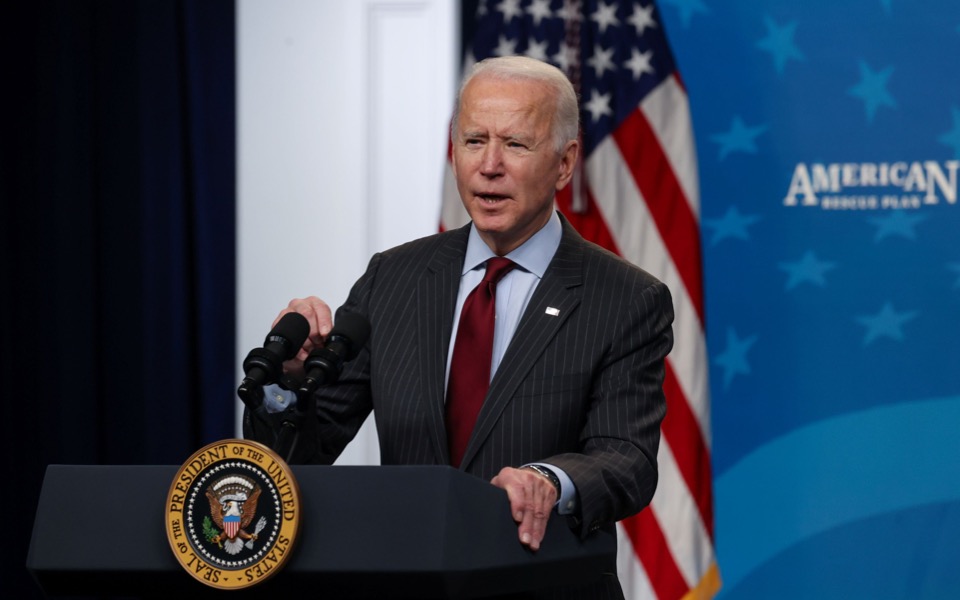Aligning US-Greek interests in the Biden era

For Europe, Joe Biden’s presidency brings high hopes for reinvigorating the transatlantic partnership. For the United States, succeeding in this task is a prerequisite for achieving an ambitious broader agenda. The Eastern Mediterranean is a vital region for European security that needs to be stable if the United States is to focus on its other national-security priorities. Easing tensions in the Eastern Mediterranean while developing a coherent and positive vision for its future requires transatlantic engagement.
After recovering from its debt crisis, Greece has emerged as a key US ally in that effort. The Biden administration will find in Greece a like-minded ally with strong democratic credentials. Greece’s unwavering commitment to NATO and its constructive engagement within the European Union, multilateral organizations and an increasing nexus of regional alliances makes it irreplaceable for achieving progress on transatlantic cooperation.
Within the framework of its strategic commitment to the EU and NATO, Greece has promoted Euro-Atlantic institutions in the Western Balkans and strengthened regional cooperation in the Eastern Mediterranean.
The United States should deepen its strategic engagement with Greece in order to jointly address the challenges that competition among global and regional powers pose for the stability and future direction of Southeastern Europe and the Eastern Mediterranean. Among these profound challenges is Turkey’s authoritarian turn and revisionist foreign policy, which undermine both Greek sovereignty and the Western alliance.
The United States remains the indispensable country and its allies are waiting for it to take the lead.
East Med stability
The US withdrawal from the Middle East, accelerated under the presidency of Donald Trump, has left a power vacuum. In the Eastern Mediterranean, the conflicts in Syria and Libya have turned into proxy wars and have exported instability to the wider region. These geopolitical challenges warrant attention and require greater transatlantic coordination to ensure peace. In recent years, in the absence of such a common strategic approach by the United States and the EU, Turkey and Russia have filled the regional vacuum.
Turkey in particular has been emboldened to undermine NATO through actions such as its acquisition of the S-400 missile system from Russia and its military intervention and lack of coordination with NATO allies in northeastern Syria. This behavior has challenged the balance of power in the region, creating room for growing Russian influence in the Eastern Mediterranean.
In response, the EU has indicated a renewed interest in working with the United States to engage Turkey, understanding that US engagement can be a catalyst for a more effective “carrot and stick” approach to the country. The understanding is mutual. In his first call with the European Commission president’s head of cabinet, US National Security Advisor Jake Sullivan agreed that the two sides would “work together on issues of mutual concern” with regard to Turkey.
Setting clear boundaries on Turkey’s expansionist agenda in the Eastern Mediterranean, as part of a roadmap to improve Turkey’s relations with the EU, will have positive knock-on effects like calming tensions with EU members Greece and Cyprus. The United States has traditionally played the role of mediator between the parties and has important economic and military leverage on both Turkey and Greece.
American clout here, however, does not mean a return to the old Cold War dynamic. As Greece has assumed a more proactive role in stabilizing its neighborhood, its relations with the United States have become increasingly independent of US relations with Turkey. During the Cold War, Turkey was given strategic priority given its value in containing the Soviet Union.
But Turkish President Recep Tayyip Erdogan’s authoritarian backsliding toward the “post-liberal” world of Presidents Vladimir Putin in Russia and Xi Jinping in China, his challenge to the territorial status quo established by international treaties (most notably the Treaty of Lausanne), and his broader revisionist foreign policy mean that a new approach will have to predominate.
Seeking to contain the crisis, Greece has shown restraint in its response to what it views as Turkey’s violation of its sovereign rights in the Eastern Mediterranean, demonstrating what US Ambassador to Greece Geoffrey Pyatt acknowledged as “forbearance” in the face of Turkish provocations. With the encouragement of the United States and its European partners, Greece has resumed exploratory talks with Turkey and continues to call for international arbitration to settle their maritime dispute. Greece needs more support to sustain these policies, and the Biden administration should provide it.
Policy proposals
* The Biden administration should leverage the flowering of US-Greece relations to promote stability and strengthen its influence in the region. It should aim to ensure Greece’s strategic role as a net security provider in the Eastern Mediterranean and the Balkans as it works with its partners and allies to address regional instability. This should involve making greater use of reliably available and strategically important military facilities in Greece, continuing US investment in Souda Bay, and increasing military financing to Greece, including through the enhancement of international military education and training (IMET), to further strengthen bilateral military cooperation.
* At the same time, the United States should continue its high-level engagement to encourage the creation of an inclusive regional security system in the Eastern Mediterranean. Further deepening and expanding the security and energy partnerships in the region would be a key step in that direction. The development of the Israel-Greece-Cyprus trilateral partnership in particular could be strengthened through continuous, high-level US engagement and the creation of the United States-Eastern Mediterranean Energy Center as envisioned in the East Med Act. Similar initiatives to deepen existing defense cooperation should be developed.
* The Biden administration should also expand Greece’s contribution to the energy security of Southeastern Europe through technology-sharing and investments that support Greece’s transition to green energy, while promoting infrastructure projects that bring new suppliers of energy to the region – including Eastern Mediterranean gas and American LNG. The United States should also support calls for Greece to join the Three Seas Initiative, which would link the Aegean to the Adriatic, Baltic, and Black Seas, further integrating and strengthening energy and other supply networks in Eastern Europe.
* The United States should continue to cultivate Greece as a key ally in its efforts to integrate Southeastern Europe with the EU and counter malign influence of foreign powers in the wider region. That should include financing support from the US International Development Finance Corporation to boost strategically important infrastructure projects, encouragement of US investment in the digital sector, and initiatives to promote transparency and awareness regarding disinformation in Greece’s open and diverse media and social-media landscape.
* The United States should also work with Greece to address regional challenges by supporting peaceful, neighborly relations with Turkey. The Biden administration should back efforts to resolve the maritime dispute between Greece and Turkey on the basis of international law. It should continue to support dialogue with Turkey and urge the two sides to resort to international arbitration should they fail to settle their dispute through that process. Such an approach is crucial to resolving tensions in the Eastern Mediterranean while also improving the climate surrounding the Cyprus negotiations. By tackling one of the recurring points of tension in Turkey’s relations with the EU and within NATO, it would also help establish the conditions for the transatlantic community to find common ground with Ankara on addressing immigration and security issues and securing Western interests in the region.
* Even as Biden welcomes the latest United Nations-led effort to resume negotiations on Cyprus and the start of exploratory talks between Greece and Turkey, he should not push for a settlement to the Cyprus issue or a resolution of the Greek-Turkish maritime dispute that undermines international law or rewards Turkey’s revisionist policy. Rather than facilitate a grand bargain with Turkey, this approach would potentially undermine political stability in Greece by unleashing a nationalist backlash in the country. As was the case during the financial and migration crises, such a development would have wider regional repercussions as well, further igniting tensions within NATO. It would also strain US relations with Greece while further emboldening Turkey to satisfy its revisionist aspirations.
George Pagoulatos is director general of the Hellenic Foundation for European and Foreign Policy (ELIAMEP) and Katerina Sokou is a nonresident senior fellow at the Atlantic Council.
You can find the authors’ policy paper on US-Greece relations in the Biden era here.





